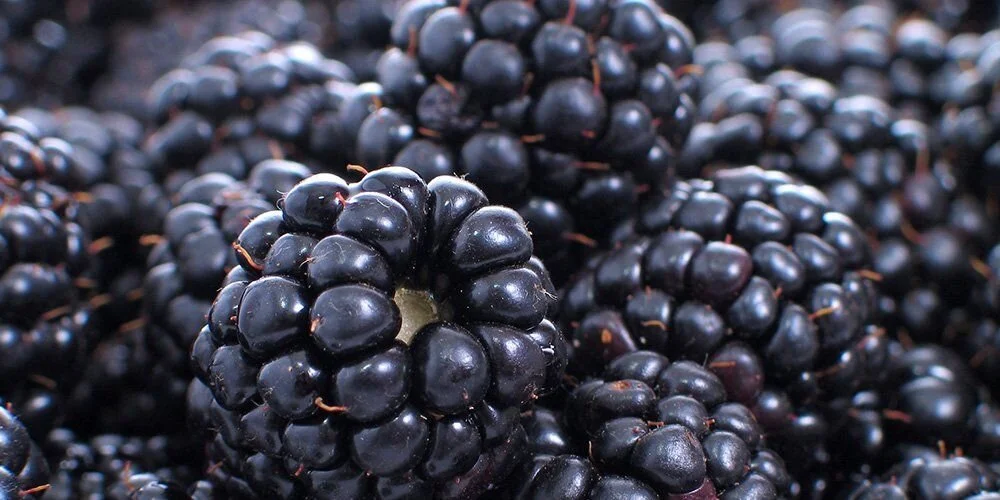Blackberry Buckle Recipe
BLACKBERRIES
Farmers grow blackberries across the United States all year round. They grow on brambles, which are a type of thorny bush. They are a delicious addition to any diet; packed with essential nutrients and antioxidants.
Blackberries contain a high level of vitamin C. One serving of 100 grams (g) contains 35 percent of an individual’s recommended daily allowance (RDA) of vitamin C. Humans are unable to synthesize their own vitamin C, so it is essential to include it as part of a healthy diet. Vitamin C is involved in protein synthesis and is necessary for the body to produce collagen and certain neurotransmitters. These processes are vital for many bodily functions, including wound healing. Vitamin C also has antioxidant properties and is involved in immune system functioning.
A 100 g serving of blackberries contains 14 percent of the RDA of fiber. Fiber is a type of carbohydrate that the body cannot break down into smaller, sugar molecules, as it does with other carbs. Fiber plays a crucial role in regulating blood sugar levels and sugar consumption. There are two types of fiber in food, soluble and insoluble. Soluble fiber dissolves in water, and it is associated with lowering blood sugar levels and helping a person maintain a healthy level of cholesterol. Insoluble fiber does not dissolve in water but supports healthy digestion. Blackberries contain both soluble and insoluble types of fiber.
Blackberries contain high levels of antioxidants, such as anthocyanins. Antioxidants help people to fight against the adverse impact of free radicals in the body. Free radicals can damage cells and are thought to be closely involved in the aging process plus other health conditions, such as cancer and heart disease. The body uses antioxidants to reduce the damage that free radicals can cause.
Blackberries are an excellent source of vitamin K. This is a necessary nutrient for blood clotting, which is essential for proper wound healing. People have also linked good bone health to vitamin K. However, it is essential that a person discusses their vitamin K intake with their doctor if they are on any blood thinners.
Blackberries also contain vitamin A, which serves several functions in the body. Vitamin A supports the immune system, which combats infections and illness. It also supports the growth and maintenance of teeth and bones, as well as keeping skin healthy. Vitamin A is responsible for producing the pigments in the retina of the eye and helps to support sight, particularly in dim lighting.
Information from
https://www.medicalnewstoday.com/articles/322052#including-blackberries-in-your-diet
BLACKBERRY BUCKLE
INGREDIENTS
1/2 cup (1 stick) unsalted butter
4 cups fresh blackberries
1 cup sugar, plus more for sprinkling
1 cup all-purpose flour
2 teaspoons baking powder
Pinch of fine sea salt
1 cup sugar
1 cup whole milk
1 teaspoon pure vanilla extract
1 teaspoon sanding sugar
Creme fraiche, whipped cream, or ice cream, for serving
DIRECTIONS
Step 1 Preheat oven to 350 degrees.
Step 2 Melt butter in a 10-inch enameled cast-iron skillet over medium heat.
Step 3 Meanwhile, place blackberries in a large bowl. Using a potato masher, mash blackberries to release their juices. If blackberries are tart, sprinkle with sugar.
Step 4 In another large bowl, whisk together flour, baking powder, and salt. Add sugar, milk, and vanilla extract; mix until well combined. Add melted butter to flour mixture; stir to combine. Pour mixture into skillet and add blackberries and their juices into the center. Sprinkle with sanding sugar.
Step 5 Transfer skillet to oven and bake until top is golden brown and a cake tester inserted into the batter comes out clean, about 1 hour. Serve warm or at room temperature with creme fraiche, whipped cream, or ice cream.
Recipe from: https://www.marthastewart.com/1106718/blackberry-buckle


